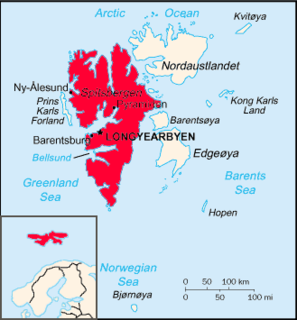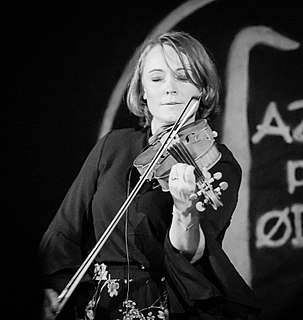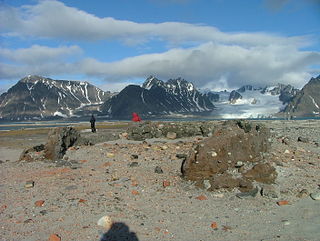Related Research Articles

Svalbard, previously known as Spitsbergen, or Spitzbergen, is a Norwegian archipelago in the Arctic Ocean. Situated north of mainland Europe, it is about midway between the northern coast of Norway and the North Pole. The islands of the group range from 74° to 81° north latitude, and from 10° to 35° east longitude. The largest island is Spitsbergen, followed by Nordaustlandet and Edgeøya, and the largest settlement is Longyearbyen.

Spitsbergen is the largest and only permanently populated island of the Svalbard archipelago in northern Norway.

Svalbard and Jan Mayen is a statistical designation defined by ISO 3166-1 for a collective grouping of two remote jurisdictions of Norway: Svalbard and Jan Mayen. While the two are combined for the purposes of the International Organization for Standardization (ISO) category, they are not administratively related. This has further resulted in the country code top-level domain .sj being issued for Svalbard and Jan Mayen, and ISO 3166-2:SJ. The United Nations Statistics Division also uses this code, but has named it Svalbard and Jan Mayen Islands.

Longyearbyen or "The Longyear Town" is the world's northernmost settlement and largest inhabited area of Svalbard, Norway. It stretches along the foot of the left bank of the Longyear Valley and on the shore of Adventfjorden, the short estuary leading into Isfjorden on the west coast of Spitsbergen, the island's broadest inlet. As of 2002 Longyearbyen Community Council became an official Norwegian municipality. It is the seat of the Governor of Svalbard, whose current mayor is Arild Olsen.

Barentsburg is the second-largest settlement on Svalbard, with about 455 inhabitants (2020), almost entirely made up of ethnic Russians and Ukrainians.

Svalbard lies under the sovereignty of Norway, but the Svalbard Treaty places several restrictions. Norway cannot use the archipelago for warlike purposes, cannot discriminate economic activity based on nationality and is required to conserve the natural environment. Uniquely, Svalbard is an entirely visa-free zone. Everybody may live and work in Svalbard indefinitely regardless of country of citizenship. Svalbard Treaty grants treaty nationals equal right of abode as Norwegian nationals. Non-treaty nationals may live and work indefinitely visa-free as well. "Regulations concerning rejection and expulsion from Svalbard" is in force on non-discriminatory basis.

The University Centre in Svalbard is a Norwegian state-owned limited company that is involved in research and provides some university-level education in Arctic studies. The company is wholly owned by the Ministry of Education and Research, and the universities of Oslo, Bergen, Tromsø, NTNU and NMBU appoint the board of directors. It is led by a director appointed by the board for a four-year term. The centre is the world’s northernmost research and higher education institution, in Longyearbyen at 78° N latitude. The courses offered fall into four main science disciplines: Arctic biology, Arctic geology, Arctic geophysics and Arctic technology.

Adolf Hoel was a Norwegian geologist, environmentalist and Polar region researcher. He led several scientific expeditions to Svalbard and Greenland. Hoel has been described as one of the most iconic and influential figures in Norwegian polar exploration in the first half of the 20th century, alongside Fridtjof Nansen and Roald Amundsen. His focus on and research of the polar areas has been largely credited as the reason Norway has sovereignty over Svalbard and Queen Maud Land in the Antarctica. Hoel was the founding director of the Norwegian Polar Institute and served as rector of the University of Oslo and as President of the Norwegian Society for the Conservation of Nature.

Svalbard is a Norwegian archipelago in the Arctic Ocean. The climate of Svalbard is principally a result of its latitude, which is between 74° and 81° north. Climate is defined by the World Meteorological Organization as the average weather over a 30-year period. The North Atlantic Current moderates Svalbard's temperatures, particularly during winter, giving it up to 20 °C (36 °F) higher winter temperature than similar latitudes in continental Russia and Canada. This keeps the surrounding waters open and navigable most of the year. The interior fjord areas and valleys, sheltered by the mountains, have fewer temperature differences than the coast, with about 2 °C lower summer temperatures and 3 °C higher winter temperatures. On the south of the largest island, Spitsbergen, the temperature is slightly higher than further north and west. During winter, the temperature difference between south and north is typically 5 °C, and about 3 °C in summer. Bear Island (Bjørnøya) has average temperatures even higher than the rest of the archipelago.

Christian Sørenssen was a Norwegian theologian, politician, and Bishop of the Church of Norway. He was bishop of the Diocese of Christianssand from 1811 until 1823 when he was appointed as the bishop of the Diocese of Christiania, a post which he held until his death in 1845.

The economy of Svalbard is dominated by coal mining, tourism and research. In 2007, there were 484 people working in the mining sector, 211 people working in the tourism sector and 111 people working in the education sector. The same year, mining gave a revenue of 2.008 billion kr, tourism NOK 317 million and research 142 million. In 2006, the average income for economically active people was NOK 494,700, or 23% higher than on the mainland. Almost all housing is owned by the various employers and institutions and rented to their employees; there are only a few privately owned houses, most of which are recreational cabins. Because of this, it is nearly impossible to live on Svalbard without working for an established institution. The Spitsbergen Treaty and Svalbard Act established Svalbard as an economic free zone and demilitarized zone in 1925.

Ole Jørn Myklebust is a Norwegian Jazz musician, educated at the Norges Musikkhøgskole. Known for performing in Subtonic, Køhn/Johansen Sextet, Geir Lysne Listening Ensemble, Østenfor Sol and Dixi, Myklebust has collaborated with Mari Boine and Unni Wilhelmsen.
Øystein Norvoll is a Norwegian jazz musician (guitar), who early was interested in and a winner of the "Gjett på Jazz" (1973). He is married to the vocalist Marit Sandvik and they gave birth to the artist Dagny Norvoll Sandvik.

Ragnhild Furebotten is a Norwegian fiddler, folk musician and composer, and former member of the traditional folk band Majorstuen and present member and founder of Hekla Stålstrenga.

Agriculture in Svalbard – the archipelago containing the world's northernmost permanently inhabited settlements – has a short history, and remains a minor economic factor, but has nonetheless had a culturally and socially significant role, as well as an ecologic impact. Svalbard is home to the Global Seed Vault, which serves to protect the world's biological and agricultural diversity. Polar Permaculture Solutions, AS was formed in January 2015. Polar Permaculture has been focused on producing locally grown food in town, and also with composting food waste.

The archaeology of Svalbard is the study of human activity in the northerly Arctic Ocean archipelago's past. The geography, environment and climate of Svalbard have resulted in exceptional preservation conditions. Archaeological fieldwork on Svalbard is both expensive and physically exhausting, but new technology and infrastructure has allowed easier access. This easier access has also resulted in more damage caused by tourists.

The Ny-Ålesund Town and Mine Museum is a museum located in Ny-Ålesund, a town on Spitsbergen, the central island of the Norwegian archipelago Svalbard in the Arctic Ocean. While some sources claim that the more well known Svalbard Museum holds the position, the museum is the world's northernmost such by virtue of Ny-Ålesund's position to the far north of the regional capital Longyearbyen.

The Spitsbergen Airship Museum is a museum located on the island of Spitsbergen in Longyearbyen, the capital of the Arctic Ocean archipelago Svalbard. It has been formally renamed as the North Pole Expedition Museum. It was co-founded by the Italian Stefano Poli and the Norwegian Ingunn Løyning. Plans to open the museum began in 2005. Originally a new building was supposed to be built to house the museum, but following a fallout with one of the share-owners in 2007 this idea was scrapped, and instead the Airship Museum was opened in 2008 in Longyearbyen's former pig farm, which previously had housed the Svalbard Museum as well.

Cannabis in Svalbard is illegal. Practically functioning as ungoverned terra nullius prior to the Svalbard Treaty of 1920, the Arctic Ocean archipelago dominated by glaciers and barren rock, is part of Norway, and hence Norwegian law applies. Under it, there is a sliding scale approach to cannabis legislation. Possession for personal use, defined as up to 15 grams, is punished with a fine of between roughly 1,500 and 15,000 Norwegian kroner. Possession of amounts larger than that is punished by jail, ranging from 6 months all the way up to 21 years. These laws are enforced by the Norwegian Police Service, the small Svalbard district of which is run by the Governor of Svalbard.

Nordnorsk Kunstmuseum is a Norwegian visual arts museum in Northern Norway. The Northern Norwegian Museum of Art is responsible for the entire northern region and in 2010 established a separate department for the nationwide program.
References
- 1 2 3 Kelman, John (21 February 2011). "Polar Jazz: Longyearbyen, Svalbard, February 3–7, 2011". All About Jazz . Retrieved 6 October 2013.CS1 maint: discouraged parameter (link)
- 1 2 3 Mosnes, Terje (9 February 2011). "Arktiske inspirasjoner: Kjølig isblått og rødglødende ekspressivitet på nye norske jazzalbum" (in Norwegian). Dagbladet . Retrieved 6 October 2013.CS1 maint: discouraged parameter (link)
- 1 2 3 Hammerø, Tor (1 March 2011). "Hvilken hyllest! Musikeren Brynjar Rasmussen og fotografen Werner Anderson har hyllet Svalbard på et vis som vil bli stående – for alltid" (in Norwegian). Nettavisen . Retrieved 6 October 2013.CS1 maint: discouraged parameter (link)
- ↑ "Nyansatt produsent Brynjar Rasmussen er nettopp ansatt som musikkprodusent ved Nordnorsk Jazzsenter" (in Norwegian). Nordnorsk Jazzsenter. 27 April 2011. Retrieved 6 October 2013.CS1 maint: discouraged parameter (link)
- ↑ "Brynjar Rasmussen Diskografi". Discogs.com. Retrieved 6 October 2013.CS1 maint: discouraged parameter (link)
- ↑ Skaanes, Per Jakob. "Christianssand String Swing Ensemble – Biography" (in Norwegian). Viser.no. Retrieved 6 October 2013.CS1 maint: discouraged parameter (link)